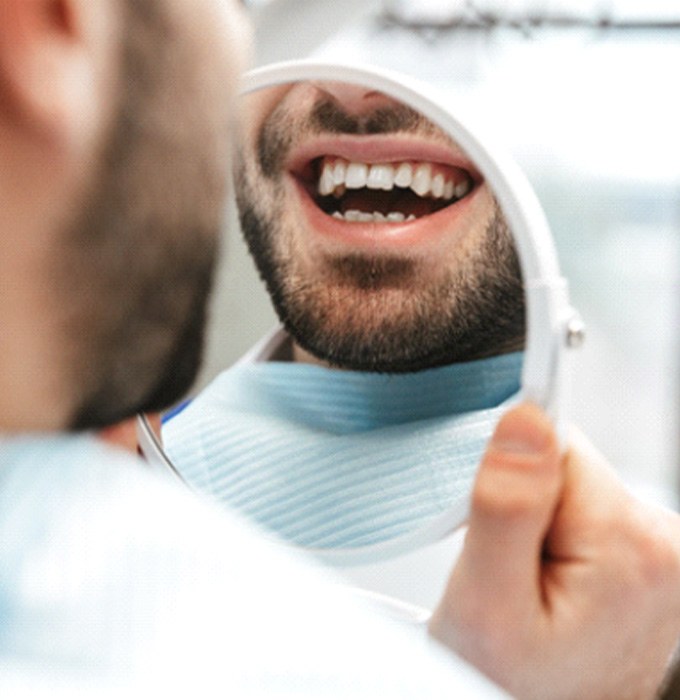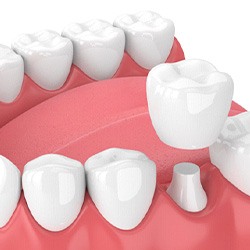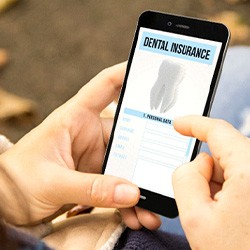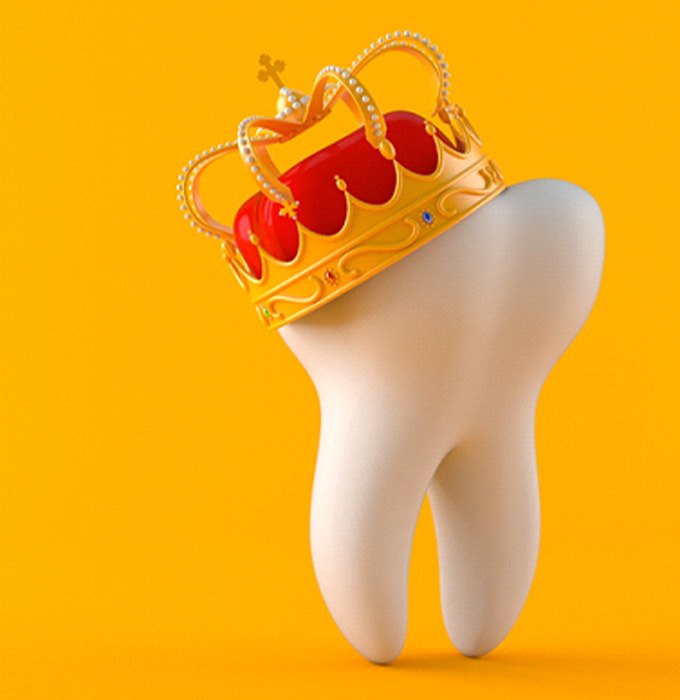
Dental Crowns – Flint, MI
The Perfect Solution For Broken Teeth!
The thing you want most if you’re dealing with a decayed, damaged, or broken tooth is relief. If you’re in Flint and you’re dealing with that issue, you should know that dental crowns from Healthy Smiles Dental Care are the perfect solution for broken teeth!
Dental crowns are able to deal with all kinds of issues, ranging from purely aesthetic issues to severely degraded teeth. If you’re in need of restorative care, give us a call today!
Why Choose Healthy Smiles Dental Care For Dental Crowns?

- Beautiful Restorations Made From High-Quality Materials.
- Same-day CEREC Crowns for Quick Restorative Care
- Accepts A Wide Variety of Insurance Plans
What Is a Dental Crown?

A dental crown is a small cap that can be placed on the tooth, protecting it from the outside and giving it greater structure. It’s used most often in situations where a tooth has undergone more damage than a filling can handle, like in the case of a fracture, severe cavity, or after a root canal. However, dental crowns are beautiful enough for people to use them for purely aesthetic purposes, making them a solid cosmetic treatment as well.
The Process of Getting a Dental Crown

There are two methods of getting a dental crown, but both will start the same way—with us taking a digital impression of your tooth and color-matching your dental crown. This is the design phase, and it’s key to making sure you wind up with your ideal restoration. This is also where you’ll be able to pick what material you’d like for your crown.
We’ll then prepare the tooth by removing a tiny amount of your enamel to make room for the dental crown. If you’re getting a crown from the dental lab, we’ll put temporary crowns over your teeth to protect them.
Then, one of two things will happen. The first is that we could send these designs to a lab for the dental crown to be crafted. This process will take a few weeks, and we’ll schedule you another appointment when it’s complete. The second is that we can make use of CEREC technology to craft you a dental crown in-office within as little as an hour, meaning that you’ll leave with a new restoration after just one appointment.
Benefits of Getting a Dental Crown

Dental crowns are used to protect the tooth from damage and to seal off areas of decay. Without one, it’s possible that your tooth good get worse, or tooth decay could potentially spread over time.
More immediately, however, is that without a dental crown a painful tooth isn’t going to get any better. If you want to relieve your discomfort, getting a restoration can be enormously helpful.
Finally, it’s common for a diseased tooth to appear discolored when compared to other teeth in the mouth. Dental crowns can be color-matched to the rest of your smile, improving your overall appearance.
Understanding the Cost of Dental Crowns

Not every patient will end up paying the same amount for dental crowns. It’s hard to form an estimate without a full understanding of your situation, so we’ll need to take a look at your teeth first before we can start figuring out how much you will likely need to pay. We will also need to discuss your financial options; dental insurance, financing, and our dental savings plan can all make fitting dental crowns into your budget easier.
Factors That Affect the Cost of Dental Crowns

You may not realize it, but the cost of dental crowns can actually vary quite a bit. During your initial consultation, we will need to consider the following questions:
- What will your crown be made of? Will it consist of metal, porcelain, or ceramic?
- How many dental crowns do you need? Is only one crown required, or will multiple need to be placed?
- Are any preliminary treatments necessary? Is the crown being placed as part of a root canal treatment or as a restoration for a dental implant?
The answers to all of these questions will ultimately help us figure out how much you can expect to pay for dental crowns. Rest assured that we will be able to provide you with a reliable estimate during your initial consultation; this number will go a long way toward helping you make choices that are smart for your smile and your bank account.
Does Dental Insurance Cover Dental Crowns?

You should never make any assumptions when it comes to dental insurance. There are many different providers to choose from, and the details of the plans they offer can vary. Before beginning any sort of treatment, you should contact your dental insurance company to confirm that the service in question is covered as well as what that coverage looks like.
With dental crowns, you can normally expect your dental insurance plan to pay a portion of the cost of the restoration. (This is assuming that the crown is needed for oral health reasons. Crowns that are placed as a cosmetic treatment typically are not eligible for dental insurance coverage.) Many insurance companies classify dental crowns as a major procedure, so they will often pay around 50% of the cost.
Options for Making Dental Crowns Affordable

While we gladly accept most PPO plans, we also realize that not everyone is able to rely on dental insurance to make the costs of oral healthcare more manageable. That’s why we also offer a few other ways to make paying for dental crowns (and other treatments you might need) a bit easier:
- Uninsured patients can sign up for our dental savings plan, which provides discounts for a number of our services. Unlike with dental insurance, you don’t have to worry about any waiting periods or annual maximums.
- We offer financing options so that our patients can break up the cost of their treatment. Even costly procedures can be made more affordable when you only have to pay a certain amount at a time.
Dental Crown FAQs

How Long Do Dental Crowns Last?
Generally, you can expect dental crowns to last between five and fifteen years. However, this can vary depending on where it is located in your mouth and which material it is made of. Crowns on the front teeth may last a little longer than crowns placed on molars. This is because they aren’t subjected to as much wear and tear from regular chewing. More so than material, the longevity of your crown depends on individual factors, like your diet, oral hygiene, and whether you have any bad habits, like smoking or chewing on ice.
Does It Hurt to Get a Dental Crown?
Many patients worry that their procedure will be painful. Fortunately, the first step is to numb the area with a local anesthetic. You shouldn’t feel a thing. For a few days after you get your dental crown, you may experience some sensitivity. This is especially the case if you also have a root canal. This can usually be managed with over-the-counter pain relievers. Because dental crowns protect vulnerable teeth from additional damage, they can actually help to prevent discomfort in the future.
What Happens If You Wait Too Long to Get a Dental Crown?
Your dentist will only recommend that you get a crown if you really need one. You may be tempted to put off this procedure, but it is best to schedule it right away after your dentist suggests it. If you wait to long, your tooth is being left exposed to chewing forces, food debris, and bacteria. This can cause damage to worsen. Eventually, your tooth could become compromised to the point where you need a root canal or an extraction.
Are Dental Crowns Covered by Insurance?
In most cases, dental crowns are partially covered by dental insurance. Every plan differs, but most consider a dental crown to be a major procedure. They are often eligible for coverage at 50% after you’ve paid your deductible and before you’ve exceeded your annual maximum. Just keep in mind that coverage is often only available for crowns that are deemed medically necessary. If you are getting a crown for cosmetic reasons, it may not receive coverage.